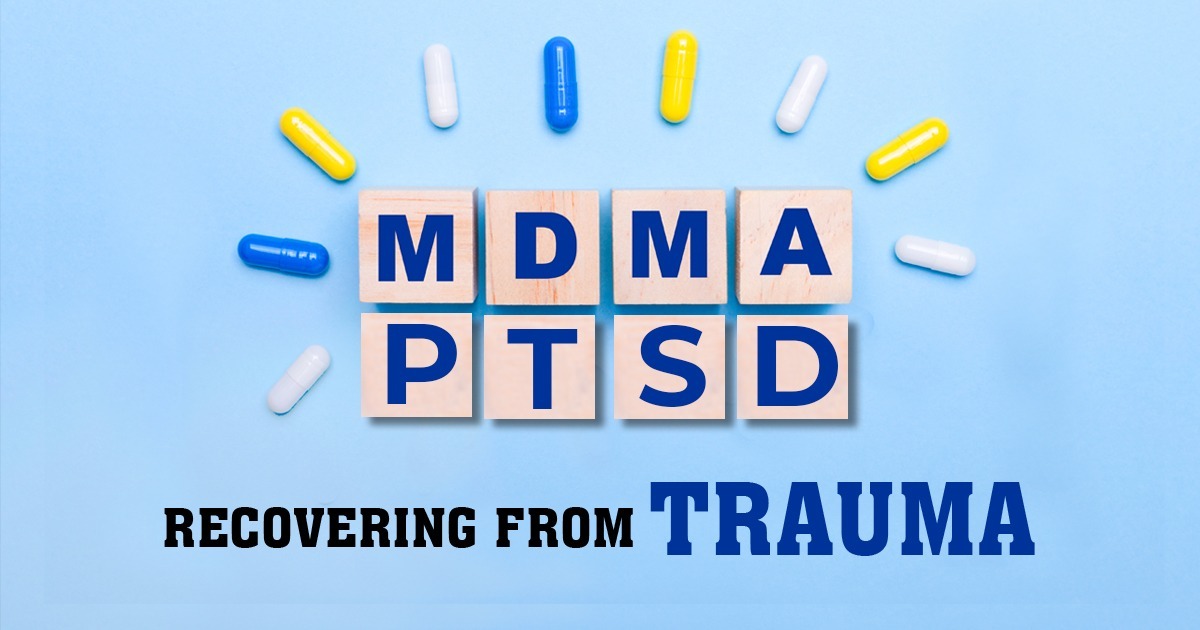
So many women have dealt with trauma. Trauma is often the underlying contributor to substance abuse problems. In an interesting turn of events, there’s research currently looking at the possibility of MDMA PTSD treatments. Researchers believe MDMA could be a potential treatment for past trauma, yet it’s also a mind-altering drug, raising some questions. With that in mind, below, we talk about what MDMA is and how it could help with trauma and severe PTSD in MDMA-assisted psychotherapy or MDMA-assisted therapy.
What is MDMA?
MDMA is a synthetic recreational drug with hallucinogenic and stimulant effects. Also known as Molly or ecstasy, MDMA comes as a capsule or tablet. Along with being energizing, this substance can create distortions in perception and time. Some people who use it recreationally find it enhances their sensory experiences, which they find enjoyable. The synthetic drug is also an entactogen. Entactogens are drugs that increase empathy and self-awareness.
When someone uses street drugs like recreational Molly or ecstasy, along with being illegal, it’s also dangerous. Molly contains contaminants in many cases when it’s purchased on the streets. When the Drug Enforcement Administration (DEA) seizes Molly from the streets, they often find it has other drugs and no MDMA at all.
As one example, researchers in Washington State and Florida analyzed substances being sold as Molly a few years ago. Those substances were primarily methylone. Methylone is a synthetic stimulant in bath salts. People who buy illegal Molly often have no idea what they’re using.
The Effects of MDMA
If you take MDMA, you might begin to feel effects within 45 minutes of the initial dose. Then, there’s a peak on the effects anywhere from 15 to 30 minutes after you initially feel the drug. These effects, on average last for three hours.
In the short-term, effects include:
- An increased sense of well-being
- More extroversion
- Empathy and emotional warmth toward others
- Willingness to talk about emotionally charged memories
- Enhanced sensory perception
These effects can sound positive and compelling, but adverse events can occur as well. Fatal overdoses are rare with this drug but possible. Acute adverse effects of using ecstasy or Molly include high blood pressure, panic attacks, and feeling faint.
One of the most significant but rare adverse effects of this substance is hyperthermia, which is a rise in body temperature. Even moderate amounts of the substance can impact your body’s ability to regulate temperature, which can lead to harmful side effects, especially in warm or hot places.

The Effects of Trauma
So many women are affected by trauma in their lives. Trauma can occur from any number of events, including rape or sexual assault, physical or verbal abuse, or exposure to something extremely frightening.
According to the American Psychological Association (APA), trauma is an emotional response to a highly negative event. Experiencing short-term trauma is a normal reaction to something terrible. Longer-term trauma can impact your daily life and functionality, at which point it might mean a diagnosis of post-traumatic stress disorder. Signs of trauma include anxiety and panic disorders, depression, and even suicidal thoughts and behaviors.
Following the event, trauma can manifest days, months, or years later.
Treating PTSD
There are various options available to treat PTSD conventionally. Examples include:
- Therapy: Like cognitive behavioral therapy, talk therapy is beneficial for people with a history of a traumatic event. When you participate in a psychotherapy session, you can learn how to cope with feelings in your life, boost your self-esteem and improve your symptoms. Psychotherapy for people diagnosed with PTSD often helps improve daily functionality.
- Eye movement desensitization and reprocessing: EMDR allows you to focus on something your therapist is doing, like flashing a light. Then, you are encouraged to replace your trauma memories with positive thoughts.
- Medications: When you have PTSD or traumatic memories, your brain often perceives and processes threats differently. Your brain chemicals may be imbalanced, so you might constantly feel on-edge or jumpy. Medications can help you with these symptoms and regain a normalized perspective.
The nature of MDMA being a “Club Drug” means that many women, and people, associate its use with traumatic experiences. Panic attacks, sexual assault, overdose, being drugged, or triggering pre-existing conditions are just some of the MDMA-related scenarios that have caused PTSD, but there is help available.
If you, or someone you love, is experiencing club drug-related trauma, or MDMA PTSD, let the team of brilliant women at Anchored Tides Recovery help. Calling 866-600-7709 will put you in touch with a care coordinator who can go over some options and provide you with some helpful information. Help is just a phone call away!































